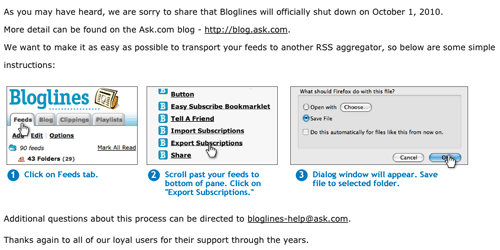
As a long-time user of Bloglines, it’s been pretty clear that the veteran online RSS reader was suffering from a lack of love lately. More often than not, when you hit the URL, you got an error message: two or three refreshes each time wasn’t unusual. The ‘beta’ version of its next incarnation showed no sign of reaching a full release.
But even so, it came as a bit of a shock over the weekend to learn that Bloglines was being closed down.
I’ve moved almost my entire online life to Google products – and yet, I never abandoned Bloglines for Google Reader. Hard to put a finger on why, really. I never really warmed to Google Reader, with all its bells and whistles… whilst Bloglines stuck doggedly to what it was good (enough) at. I particularly liked its stripped-back mobile interface, which allowed for ‘one click to download everything’ reading: perfect for long train journeys through patchy 3G coverage.
The justification comes on the blog of its parent, AskJeeves.com – which, yes, is still going.
The Internet has undergone a major evolution. The real-time information RSS was so astute at delivering (primarily, blog feeds) is now gained through conversations, and consuming this information has become a social experience. … Today RSS is the enabling technology – the infrastructure, the delivery system. RSS is a means to an end, not a consumer experience in and of itself. As a result, RSS aggregator usage has slowed significantly, and Bloglines isn’t the only service to feel the impact. The writing is on the wall.
I’m not sure how to feel about that. You see, before I became obsessed by WordPress, I was obsessed by RSS. Indeed, its approach to RSS was one of the reasons I fell for WordPress in the first place. Yet I still don’t think the usefulness of RSS is widely appreciated.
I don’t agree with the Ask.com blog, which says its place has been taken by Twitter and Facebook: that seems a very individual-centric perspective. That may be true for blogs specifically, person to person; but I don’t think it holds true for larger-scale publishing – website to consumer, or indeed, website to website. I always wondered if the name Bloglines was holding the product back: perhaps this is proof.
So, farewell Bloglines. It was fun while it lasted. I still don’t want to switch to Google Reader – but I need a solution which works seamlessly across iPhone, Android, Mac, Windows, Linux, everything. I’m not sure there’s any serious alternative to Google Reader now… but the immediate plan is to experiment with the various platform-specific clients which sync with it. Recommendations, anyone?
Responses
It is kind of sad that Bloglines is gone – though I ditched it years ago. The fact that Google Reader remains pretty much the only player in the SaaS RSS reader market is a shame – and even the future of that product is in doubt, especially when you consider the Play interface introduced recently.
I kind of see the point where people subscribe to Twitter feeds from sites they like rather than use an aggregator, but the real time nature of that means you are bound to miss stuff.
Some of the newer ways of using RSS, like the iPad apps such as Flipboard etc are interesting and lovely to look at, but pretty much all leave me cold. I want an easy way to read all the stuff I am interested in, with tools to easily and quickly share content.
Desktop clients – by far the best one is FeedDemon on Windows – indeed its the best on any platform (for a long while I ran XP in a virtual machine on my mac just to run FD!). Liferea is pretty good on *nix.
Another option I came across the other day is Tiny Tiny RSS – like Bloglines et al but you run it on your own server: http://tt-rss.org/redmine/wiki/tt-rss
I’m with Dave – I’m very happy with FeedDemon. It sycnhronises with Google Reader, which means I can pick up in GoogleReader where I left off in FeedDemon if I want to read my feeds when I’m away from my own computer. I use FeedDemon on 2 different PCs and because they both synchronise with Google Reader, they both keep track of what is unread.
After some brief experimentation this morning, I’ve settled – for now – on Gruml for the Mac; gReader for the Android phone; and MobileRSS on the iPhone (well, iPod Touch).
But the biggest surprise has been the fact that actually, I don’t dislike Google Reader’s web interface as much as I thought I did. There’s definite convenience in using a tool optimised for each specific platform, especially on the mobile devices, but the web interface would be perfectly acceptable.
I agree with Simon about RSS not just being about end-users consuming online information but also about a way of stitching different services together. I think it’s got a lot of mileage for the latter role even if (despite the many advantages of RSS readers), RSS has never broken out of a small niche of users for reading content.
I’m also forcing myself to love Google Reader, bah.